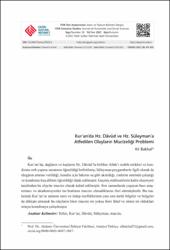Kur’an’da Hz. Dâvûd ve Hz. Süleyman’a Atfedilen Olayların Mucizeliği Problemi
Citation
BAKKAL, Ali. "Kur’an’da Hz. Dâvûd ve Hz. Süleyman’a Atfedilen Olayların Mucizeliği Problemi." FSM İlmî Araştırmalar İnsan ve Toplum Bilimleri Dergisi, 18 (2021): 417-450.Abstract
Kur’an’da, dağların ve kuşların Hz. Dâvûd’la birlikte Allah’ı tesbih ettikleri ve kendisine
zırh yapma sanatının öğretildiği belirtilmiş; Süleyman peygamberle ilgili olarak da
rüzgârın emrine verildiği, kendisi için bakırın su gibi akıtıldığı, cinlerin emrinde çalıştığı
ve kendisine kuş dilinin öğretildiği ifade edilmiştir. Geçmiş müfessirlerin kahir ekseriyeti
tarafından bu olaylar mucize olarak kabul edilmiştir. Son zamanlarda yaşayan bazı araştırmacı
ve akademisyenler ise bunların mucize olmadıklarını ileri sürmüşlerdir. Bu makalede
Kur’an’ın anlatım tarzı ve üslup özelliklerinin yanı sıra tarihi bilgiler ve belgeler
de dikkate alınarak bu olayların birer mucize mi yoksa birer lütuf ve nimet mi oldukları
ortaya konulmaya çalışılmıştır. In the Qur’an, it is stated that mountains and birds glorify Allah with David and he
was taught the art of making armor; regarding the prophet Solomon, it was stated that the
wind was given to his command, copper was flowed like water for him, the jinns worked
under the command of him, and he was taught the language of the birds. All of these
events have been perceived as miracles by most of the past mufassirs. Some researchers
and academicians living recently have argued that these are not miracles. In this article, it
is tried to reveal whether these events are miracles or blessings by taking into account the
style of the Qur’an and historical information and documents.



















